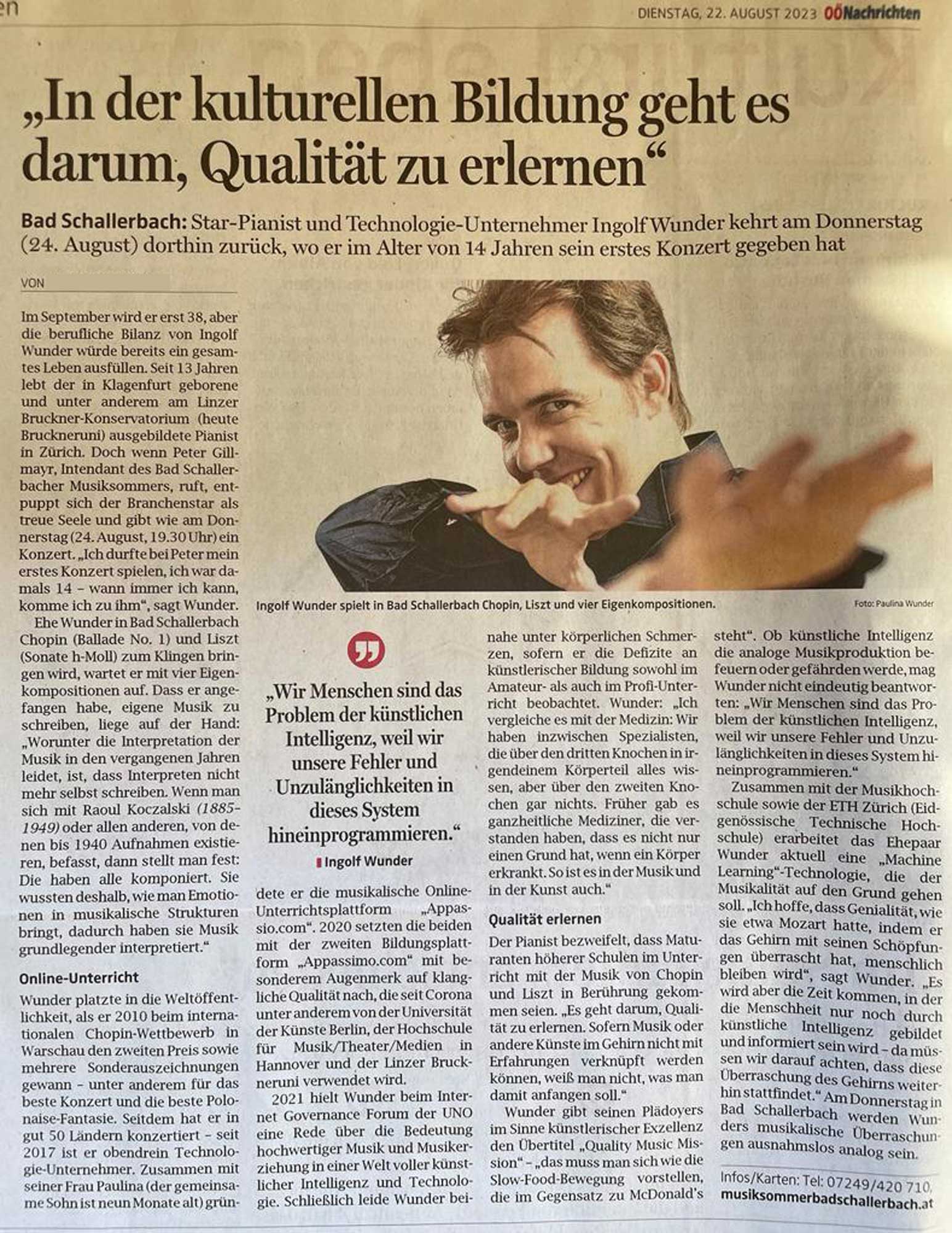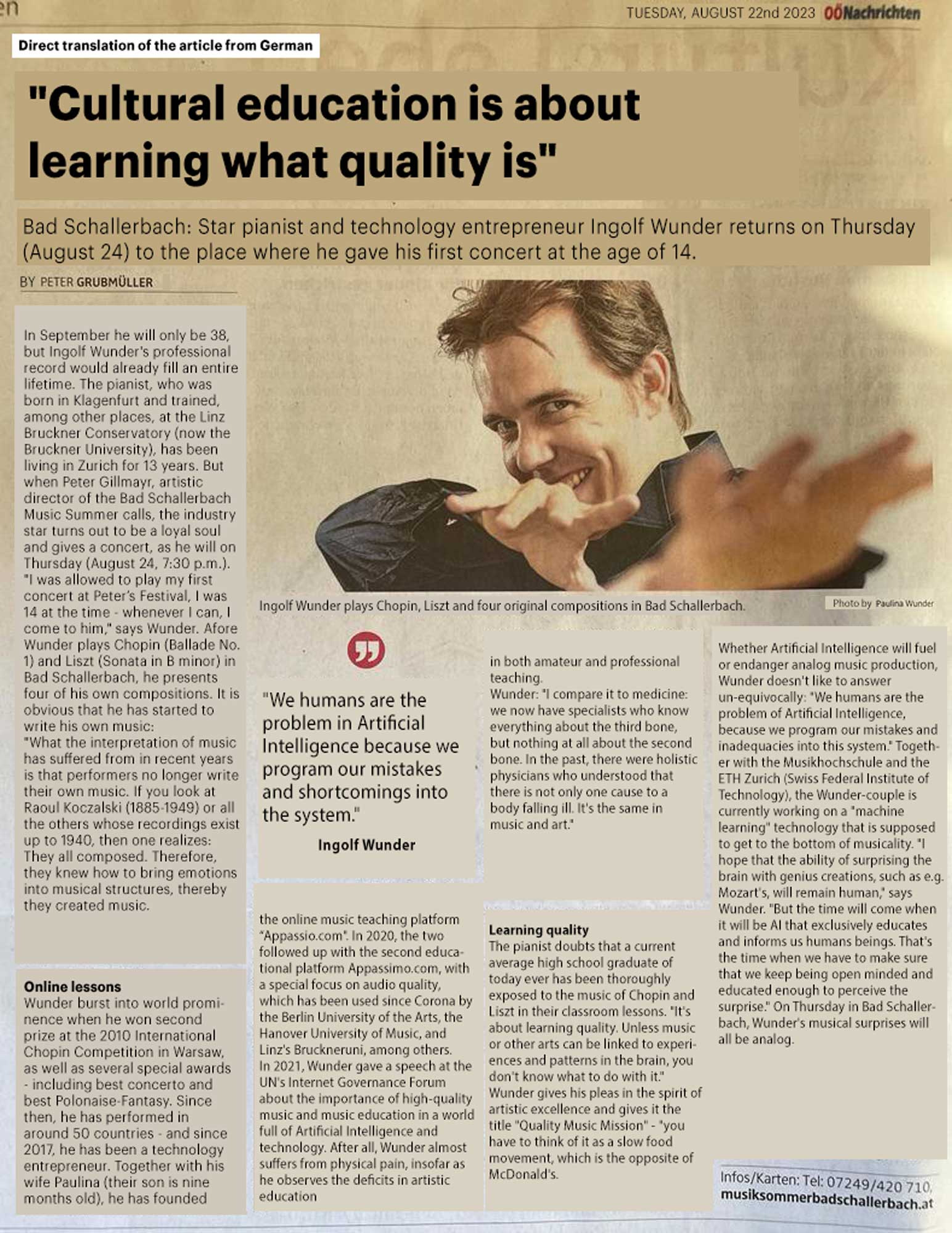Ingolf Wunder was recently interviewed by Oberösterreichische Nachrichten, a leading newspaper in Austria about music and technology. Here is the direct translation of the article originally written in German.
“Cultural education is about learning what quality is”
Bad Schallerbach: Star pianist and technology entrepreneur Ingolf Wunder returns on Thursday
(August 24) to the place where he gave his first concert at the age of 14.
By Peter Grubmüller
In September he will only be 38, but Ingolf Wunder’s professional record would already fill an entire lifetime. The pianist, who was born in Klagenfurt and trained, among other places, at the Linz Bruckner Conservatory (now the Bruckner University), has been living in Zurich for 13 years. But when Peter Gillmayr, artistic director of the Bad Schallerbach Music Summer, calls, the industry star turns out to be a loyal soul and gives a concert, as he will on Thursday (August 24, 7:30 p.m.). “I was allowed to play my first concert at Peter’s Festival, I was 14 at the time – whenever I can, I come to him,” says Wunder. Afore Wunder plays Chopin (Ballade No. 1) and Liszt (Sonata in B minor) in Bad Schallerbach, he presents four of his own compositions. It is obvious that he has started to write his own music:
“What the interpretation of music has suffered from in recent years is that performers no longer write their own music. If you look at Raoul Koczalski (1885-1949) or all the others whose recordings exist up to 1940, then one realizes:
They all composed. Therefore, they knew how to bring emotions into musical structures, thereby they created music.
Online lessons
Wunder burst into world prominence when he won second prize at the 2010 International Chopin Competition in Warsaw, as well as several special awards – including best concerto and best Polonaise-Fantasy. Since then, he has performed in around 50 countries – and since 2017, he has been a technology entrepreneur. Together with his wife Paulina (their son is nine months old), he has founded the online music teaching platform “Appassio.com“. In 2020, the two followed up with the second educational platform “Appassimo.com“, with a special focus on audio quality, which has been used since Corona by the Berlin University of the Arts, the Hanover University of Music, and Linz’s Bruckneruni, among others. In 2021, Wunder gave a speech at the UN’s Internet Governance Forum about the importance of high-quality music and music education in a world full of Artificial Intelligence and technology. After all, Wunder almost suffers from physical pain, insofar as he observes the deficits in artistic education in both amateur and professional teaching. Wunder: “I compare it to medicine: we now have specialists who know everything about the third bone, but nothing at all about the second bone. In the past, there were holistic physicians who understood that there is not only one cause to a body falling ill. It’s the same in music and art.”
“We humans are the problem in Artificial Intelligence because we program our mistakes and shortcomings into the system.” Ingolf Wunder
Learning quality
The pianist doubts that a current average high school graduate of today ever has been thoroughly exposed to the music of Chopin and Liszt in their classroom lessons. “It’s about learning quality. Unless music or other arts can be linked to experiences and patterns in the brain, you don’t know what to do with it.” Wunder gives his pleas in the spirit of artistic excellence and gives it the title “Quality Music Mission” – “you have to think of it as a slow food movement, which is the opposite of McDonald’s.”
Whether Artificial Intelligence will fuel or endanger analog music production, Wunder doesn’t like to answer unequivocally: “We humans are the problem of Artificial Intelligence, because we program our mistakes and inadequacies into this system.” Together with the Musikhochschule and the ETH Zurich (Swiss Federal Institute of Technology), the Wunder-couple is working on a “machine learning” technology that is supposed to get to the bottom of musicality. “I hope that the ability of surprising the brain with genius creations, such as e.g. Mozart’s, will remain human,” says Wunder. “But the time will come when it will be AI that exclusively educates and informs us humans beings. That’s the time when we have to make sure that we keep being open minded and educated enough to perceive the surprise.” On Thursday in Bad Schallerbach, Wunder’s musical surprises will all be analog.
Original language (German)
„In der kulturellen Bildung geht es darum, Qualität zu erlernen”
Bad Schallerbach: Star-Pianist und Technologie-Unternehmer Ingolf Wunder kehrt am Donnerstag
(24. August) dorthin zurück, wo er im Alter von 14 Jahren sein erstes Konzert gegeben hat
von Peter Grubmüller
Im September wird er erst 38, aber die berufliche Bilanz von Ingolf Wunder würde bereits ein gesamtes Leben ausfüllen. Seit 13 Jahren lebt der in Klagenfurt geborene und unter anderem am Linzer Bruckner-Konservatorium (heute Bruckneruni) ausgebildete Pianist in Zürich. Doch wenn Peter Gillmayr, Intendant des Bad Schaller-bacher Musiksommers, ruft, entpuppt sich der Branchenstar als treue Seele und gibt wie am Donnerstag (24. August, 19.30 Uhr) ein Konzert. “Ich durfte bei Peter mein erstes Konzert spielen, ich war damals 14 – wann immer ich kann, komme ich zu ihm”, sagt Wunder.
Ehe Wunder in Bad Schallerbach Chopin (Ballade No. 1) und Liszt (Sonate h-Moll) zum Klingen bringen wird, wartet er mit vier Eigenkompositionen auf. Dass er angefangen habe, eigene Musik zu schreiben, liege auf der Hand:
“Worunter die Interpretation der Musik in den vergangenen Jahren leidet, ist, dass Interpreten nicht mehr selbst schreiben. Wenn man sich mit Raoul Koczalski (1885-1949) oder allen anderen, von denen bis 1940 Aufnahmen existieren, befasst, dann stellt man fest: Die haben alle komponiert. Sie wussten deshalb, wie man Emotionen in musikalische Strukturen bringt, dadurch haben sie Musik grundlegender interpretiert.”
Online-Unterricht
Wunder platzte in die Weltöffentlichkeit, als er 2010 beim internationalen Chopin-Wettbewerb in Warschau den zweiten Preis sowie mehrere Sonderauszeichnungen gewann – unter anderem für das beste Konzert und die beste Polonaise-Fantasie. Seitdem hat er in gut 50 Ländern konzertiert – seit 2017 ist er obendrein Technologie Unternehmer. Zusammen mit seiner Frau Paulina (der gemeinsame Sohn ist neun Monate alt) gründete er die musikalische Online-Unterrichtsplattform “Appassio.com”. 2020 setzten die beiden mit der zweiten Bildungsplattform “Appassimo.com” mit besonderem Augenmerk auf klangliche Qualität nach, die seit Corona unter anderem von der Universität der Künste Berlin, der Hochschule für Musik/Theater/Medien in Hannover und der Linzer Bruckneruni verwendet wird, 2021 hielt Wunder beim Internet Governance Forum der UNO eine Rede über die Bedeutung hochwertiger Musik und Musikerziehung in einer Welt voller künstlicher Intelligenz und Technologie. Schließlich leide Wunder beinahe unter körperlichen Schmerzen, sofern er die Defizite an künstlerischer Bildung sowohl im Amateur- als auch im Profi-Unterricht beobachtet. Wunder: Ich vergleiche es mit der Medizin: Wir haben inzwischen Spezialisten, die über den dritten Knochen in irgendeinem Körperteil alles wissen, aber über den zweiten Knochen gar nichts. Früher gab es ganzheitliche Mediziner, die verstanden haben, dass es nicht nur einen Grund hat, wenn ein Körper erkrankt. So ist es in der Musik und in der Kunst auch.”
Qualität erlernen
Der Pianist bezweifelt, dass Maturanten höherer Schulen im Unterricht mit der Musik von Chopin und Liszt in Berührung gekommen seien. „Es geht darum, Qualität zu erlernen. Sofern Musik oder andere Künste im Gehirn nicht mit Erfahrungen verknüpft werden können, weiß man nicht, was man damit anfangen soll.”
Wunder gibt seinen Plädoyers im Sinne künstlerischer Exzellenz den Übertitel „Quality Music Mission” – das muss man sich wie die Slow-Food-Bewegung vorstellen, die im Gegensatz zu McDonald’s steht”. Ob künstliche Intelligenz die analoge Musikproduktion befeuern oder gefährden werde, mag Wunder nicht eindeutig beantworten: „Wir Menschen sind das Problem der künstlichen Intelligenz, weil wir unsere Fehler und Unzulänglichkeiten in dieses System hineinprogrammieren.”
Zusammen mit der Musikhochschule sowie der ETH Zürich (Eidgenössische Technische Hochschule) erarbeitet das Ehepaar Wunder aktuell eine „Machine Learning”-Technologie, die der Musikalität auf den Grund gehen soll. Ich hoffe, dass Genialität, wie sie etwa Mozart hatte, indem er das Gehirn mit seinen Schöpfungen überrascht hat, menschlich bleiben wird”, sagt Wunder. „Es wird aber die Zeit kommen, in der die Menschheit nur noch durch künstliche Intelligenz gebildet und informiert sein wird – da müssen wir darauf achten, dass diese Überraschung des Gehirns weiterhin stattfindet.” Am Donnerstag in Bad Schallerbach werden Wunders musikalische Überraschungen ausnahmslos analog sein.
Zitat: „Wir Menschen sind das Problem der künstlichen Intelligenz, weil wir unsere Fehler und Unzulänglichkeiten in dieses System hineinprogrammieren.” Ingolf Wunder





Comment